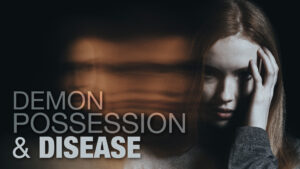Demon Possession and Disease
Demon Possession and Disease
In a recent email that came to our offices at Apologetics Press, we received a question about demon possession and disease. The questioner had read the article on our site, in which Wayne Jackson stated that he believed demon possession ceased during the first century, saying: “Apparently, demon possession was permitted temporarily in order that the authority of Christ might be made manifest.”1 The inquirer wanted to know how it could be the case that demon possession was temporarily permitted during the first century, but we still have the diseases and maladies such as blindness, deafness, and epilepsy, that the New Testament attributes to demon possession. If demon possession does not still take place, shouldn’t all the diseases associated with it be gone as well?
First, let us establish the fact that the New Testament clearly shows that demon possession did occur during the first century while Jesus was on Earth and during the miraculous age of the Church. On a number of occasions, we read that Jesus cast out demons. For instance, Matthew 8:16 states, “When evening had come, they brought to Him many who were demon-possessed. And He cast out the spirits with a word and healed all who were sick.” Notice that the text makes a distinction between casting out demons and healing those who were sick. In addition, verses such as this one make a very general statement about Jesus “casting out demons.” They do not detail how it was done, whether He talked with the demon, or what other events happened during the process.
In other cases, the Bible gives specific details about the events that occurred when Jesus cast out demons. The story of Legion is one of the most well-known accounts of Jesus talking to a group of demons who begged Him to let them go into a herd of swine. Jesus complied with their request, and the herd of 2,000 pigs rushed down the hill into the water and drowned (Luke 8:26-39). Notice that in this account, the demons that possessed the man could talk, and could affect other physical entities such as the pigs when they were cast out of the man. Whatever physical effects the demons had on the man were eliminated once Jesus cast them out. The important point here is that the demon possession of the man and of the pigs brought about different physical effects. The herd of pigs did not rush down the hill to their deaths because of an extremely contagious disease that somehow instantaneously was transferred from the man to 2,000 pigs without affecting any of the other people present. The biblical writer obviously was not treating this account of demon possession as if it was the equivalent of a sickness. The writer recognized that the demons were capable of bringing about certain physical effects in the man, and different physical effects in the herd of swine.
In Matthew 4:23-24 we read: “And Jesus went about all Galilee, teaching in their synagogues, preaching the gospel of the kingdom, and healing all kinds of sickness and all kinds of disease among the people. Then His fame went throughout all Syria; and they brought to Him all sick people who were afflicted with various diseases and torments, and those who were demon-possessed, epileptics, and paralytics; and He healed them.” Notice that the text says that people had “various diseases,” and it mentions others who were “demon-possessed, epileptics, and paralytics.” Again, this verse helps us see that a person could have epilepsy or be paralyzed without being demon-possessed. The New Testament does not assume that a person was demon-possessed just because he/she had a disease or physical malady. While it was true that some people who were epileptic, blind, or mute were that way because of demon possession (Mark 9:25; Matthew 12:22), others who had those same physical maladies were not said to be demon-possessed. Take, for instance, the blind man in John 9. Jesus healed him of blindness, but the Bible says nothing about him being demon-possessed. He was born blind. So, it was not the case that the Bible necessarily associated blindness with demon possession. In fact, we read that God personally struck some groups of people in the Old Testament with blindness (2 Kings 6:18-23; Genesis 19:11). And the New Testament records that through Paul’s actions, the wicked sorcerer, Bar-Jesus, was struck blind by “the hand of the Lord” (Acts 13:11).
It becomes clear, then, that demon possession could result in certain “diseases or torments” such as blindness, deafness, and being mute, but other causes existed for those infirmities as well. Let us consider this illustration. There are several reasons why a car might swerve off the road and crash into a ditch. The driver might be texting instead of paying attention. The steering wheel might break and fail to effectively turn the car. A carjacker from the backseat might knock the driver unconscious and take the wheel and intentionally crash it. In each case, a person watching from the street sees the car veer off the road into the ditch. The effect is the same, but the cause is different. So, if we think of the carjacker as a demon who was given the ability to afflict a person’s body in the first century with some kind of disease, that would not mean that every time we see that disease, it would be caused by a demon. Other natural situations, such as physical accidents injuring the brain, might cause epilepsy. Staring too long at the Sun could cause blindness. Prolonged exposure to very loud noises could cause deafness, etc. The Bible writers often recognized various causes of physical diseases and maladies such as blindness. Demon possession was just one among many.
Thus, we see that God could have allowed demon possession in the first century in order to prove that Jesus and the Holy Spirit, through the apostles and early Church, had power over the spiritual realm as well as the physical. It makes sense that this brief period of time would have ended with the disappearance of the miraculous spiritual gifts in the Church, when the last person who was touched by an apostle and given a miraculous spiritual gift died (see Acts 8:18; Zechariah 13:1-2). Physical diseases and maladies such as epilepsy, blindness, or deafness would continue, however, since there have always been numerous natural causes for them which were not connected to demon possession.
Endnotes
1 Wayne Jackson, “Demon Possession, the Bible, and Superstition,” https://apologeticspress.org/demon-possession-the-bible-and-superstition-1154/.

REPRODUCTION & DISCLAIMERS: We are happy to grant permission for this article to be reproduced in part or in its entirety, as long as our stipulations are observed.



0 Comments:
Post a Comment
<< Home